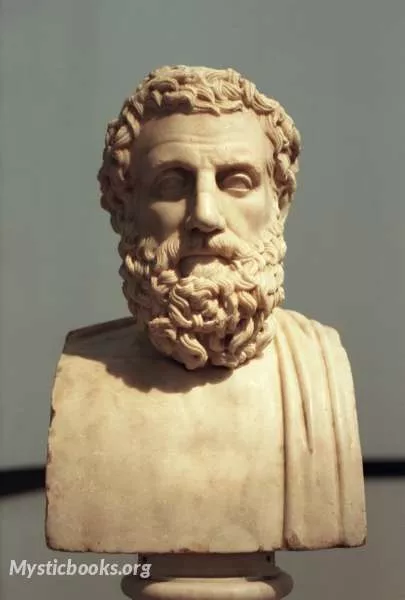
Timeline
Title
Country/Nationality
Aeschylus
Aeschylus was an ancient Greek author of Greek tragedy, and is often described as the father of tragedy. Academics' knowledge of the genre begins with his work, and understanding of earlier Greek tragedy is largely based on inferences made from reading his surviving plays. According to Aristotle, he expanded the number of characters in the theatre and allowed conflict among them. Before this, characters interacted only with the chorus.
Aeschylus was born in c. 525 BC in Eleusis, a small town about 27 km northwest of Athens, in the fertile valleys of western Attica. Some scholars argue that his date of birth may be based on counting back forty years from his first victory in the Great Dionysia. His family was wealthy and well established. His father, Euphorion, was a member of the Eupatridae, the ancient nobility of Attica. But this might be a fiction invented by the ancients to account for the grandeur of Aeschylus' plays.
In 510 BC, when Aeschylus was 15 years old, Cleomenes I expelled the sons of Peisistratus from Athens, and Cleisthenes came to power. Cleisthenes' reforms included a system of registration that emphasized the importance of the deme over family tradition. In the last decade of the 6th century, Aeschylus and his family were living in the deme of Eleusis.
In 480 BC, Aeschylus was called into military service again, together with his younger brother Ameinias, against Xerxes I's invading forces at the Battle of Salamis. Aeschylus also fought at the Battle of Plataea in 479 BC. Ion of Chios was a witness for Aeschylus' war record and his contribution in Salamis. Salamis holds a prominent place in The Persians, his oldest surviving play, which was performed in 472 BC and won first prize at the Dionysia.
Aeschylus travelled to Sicily once or twice in the 470s BC, having been invited by Hiero I of Syracuse, a major Greek city on the eastern side of the island He produced The Women of Aetna during one of these trips (in honor of the city founded by Hieron), and restaged his Persians. By 473 BC, after the death of Phrynichus, one of his chief rivals, Aeschylus was the yearly favorite in the Dionysia, winning first prize in nearly every competition. In 472 BC, Aeschylus staged the production that included the Persians, with Pericles serving as choregos.
Aeschylus married and had two sons, Euphorion and Euaeon, both of whom became tragic poets. Euphorion won first prize in 431 BC in competition against both Sophocles and Euripides. A nephew of Aeschylus, Philocles (his sister's son), was also a tragic poet, and won first prize in the competition against Sophocles' Oedipus Rex. Aeschylus had at least two brothers, Cynegeirus and Ameinias.
In 458 BC, Aeschylus returned to Sicily for the last time, visiting the city of Gela, where he died in 456 or 455 BC.
Books by Aeschylus
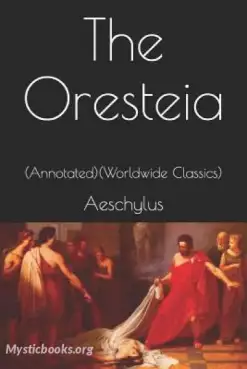
The Oresteia
The Oresteia is a trilogy of Greek tragedies written by Aeschylus in the 5th century BC, concerning the murder of Agamemnon by Clytemnestra, the murder of Clytemnestra by Orestes, the trial of Orestes, the end of the curse on the House of Atreus and...
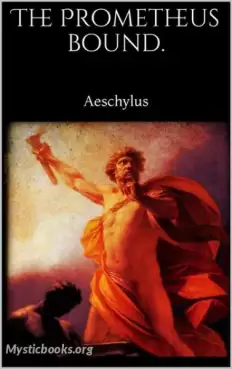
Prometheus Bound
Prometheus Bound is an Ancient Greek tragedy traditionally ascribed to Aeschylus and now thought to have been composed sometime between 479 BC and the terminus ante quem of 424 BC. The tragedy is based on the myth of Prometheus, a Titan who defies Ze...
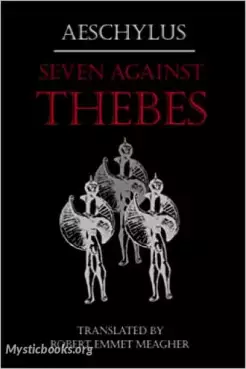
Seven Against Thebes
Seven Against Thebes is the third play in an Oedipus-themed trilogy produced by Aeschylus in 467 BC. The trilogy is sometimes referred to as the Oedipodea. It concerns the battle between an Argive army led by Polynices and the army of Thebes led by E...
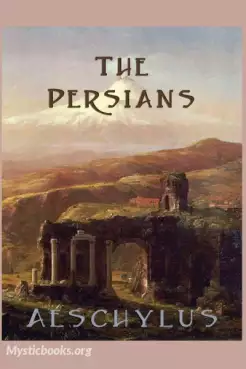
The Persians
The Persians is an ancient Greek tragedy written during the Classical period of Ancient Greece by the Greek tragedian Aeschylus. It is the second and only surviving part of a now otherwise lost trilogy that won the first prize at the dramatic competi...
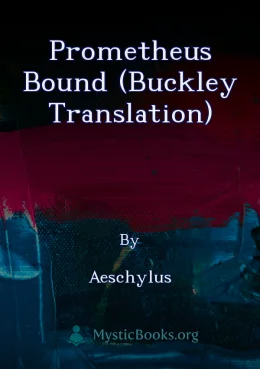
Prometheus Bound (Buckley Translation)
Aeschylus's "Prometheus Bound" is a classic Greek tragedy that tells the story of Prometheus, a Titan who defied the gods by giving fire and knowledge to humanity. As punishment, Zeus chains Prometheus to a rock, where he is tormented by an eagle tha...

Prometheus Bound (Browning Translation)
Prometheus Bound, a Greek tragedy by Aeschylus, tells the story of Prometheus, a Titan who defied Zeus, the king of the gods, by stealing fire from the heavens and gifting it to humanity. For this act of defiance, Prometheus is chained to a rock in t...
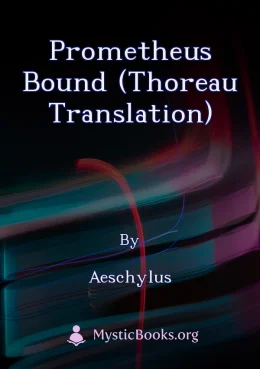
Prometheus Bound (Thoreau Translation)
Prometheus Bound is a classic Greek play that tells the story of Prometheus, a Titan who defied the gods by giving fire to humanity. For this act of defiance, he is chained to a rock and tortured by Zeus. The play explores themes of free will, fate,...
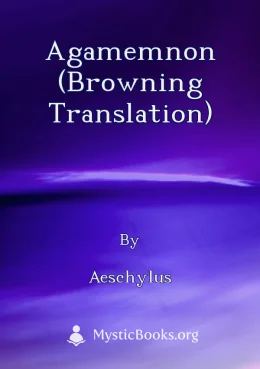
Agamemnon (Browning Translation)
Agamemnon, by Aeschylus, is a powerful and tragic play that explores themes of revenge, betrayal, and the consequences of hubris. It is the first part of Aeschylus's Oresteia trilogy, which tells the story of the House of Atreus. The play opens with...
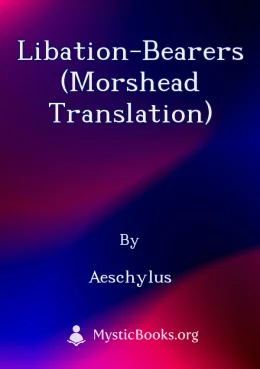
Libation-Bearers (Morshead Translation)
The Libation Bearers is the second play in Aeschylus' Oresteia trilogy, exploring the aftermath of Agamemnon's murder. The play focuses on the reunion of Orestes and Electra, Agamemnon's children, who are consumed by the desire for revenge against th...

Furies (Morshead Translation)
The "Eumenides", also known as "The Kindly Ones", is the final play in Aeschylus's renowned trilogy, "The Oresteia." It follows the aftermath of Orestes's act of matricide, the slaying of his mother Clytemnestra to avenge his father Agamemnon's murde...
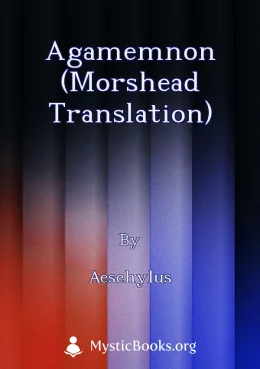
Agamemnon (Morshead Translation)
Agamemnon, the first play in Aeschylus' Oresteia trilogy, chronicles the homecoming of King Agamemnon from the Trojan War. His wife, Clytemnestra, fueled by a desire for vengeance for the sacrifice of their daughter, Iphigenia, and driven by her adu...
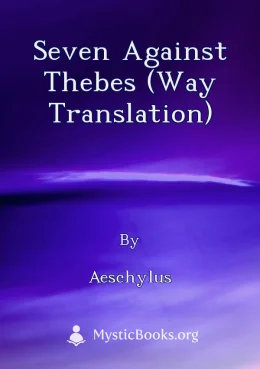
Seven Against Thebes (Way Translation)
Seven Against Thebes, a tragedy written by Aeschylus, recounts the legendary conflict between the warring brothers Eteocles and Polynices. Following Oedipus's curse on his sons, they are destined to divide the kingdom of Thebes through bloodshed. Ete...
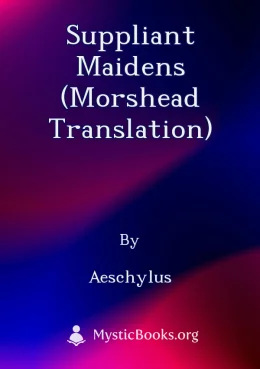
Suppliant Maidens (Morshead Translation)
The Suppliants, by Aeschylus, is a Greek tragedy that tells the story of the Danaids, fifty daughters fleeing a forced marriage to their Egyptian cousins. They seek refuge in Argos, pleading with King Pelasgus for protection. The play explores themes...